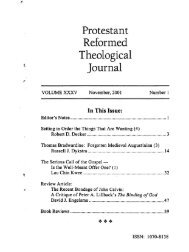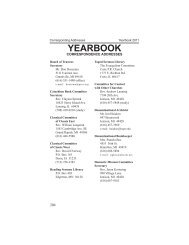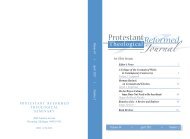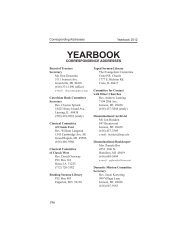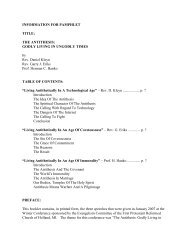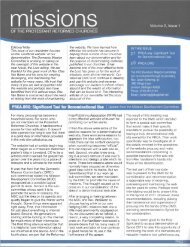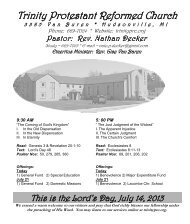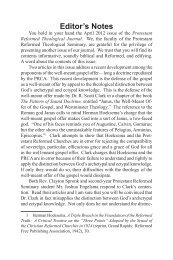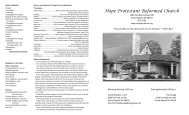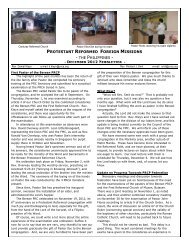November 2007 - Protestant Reformed Churches in America
November 2007 - Protestant Reformed Churches in America
November 2007 - Protestant Reformed Churches in America
Create successful ePaper yourself
Turn your PDF publications into a flip-book with our unique Google optimized e-Paper software.
Book Reviews<br />
the very dubious honor of be<strong>in</strong>g<br />
appealed to by the Remonstrants<br />
<strong>in</strong> the Netherlands some<br />
year later.<br />
As to the question faced by<br />
this book, whether or not<br />
Bull<strong>in</strong>ger was the “author of<br />
the other <strong>Reformed</strong> tradition,”<br />
this <strong>in</strong>troduces the doctr<strong>in</strong>e of<br />
the covenant. Bull<strong>in</strong>ger was<br />
the first of the Reformers to<br />
write a treatise on the covenant.<br />
Bull<strong>in</strong>ger does not connect<br />
election with the covenant.<br />
He does use the term<br />
“conditions.” One f<strong>in</strong>ds <strong>in</strong> this<br />
treatise ambiguity that feeds<br />
debates about what Bull<strong>in</strong>ger<br />
really meant. In the History<br />
of Dogma class that I teach,<br />
students are assigned to read<br />
Bull<strong>in</strong>ger’s treatise on the covenant.<br />
Students regularly<br />
struggle with a lack of precision<br />
<strong>in</strong> this treatise. Much<br />
depends on what Bull<strong>in</strong>ger<br />
<strong>in</strong>ger’s weakness on predest<strong>in</strong>ation,<br />
will cause the debate to<br />
cont<strong>in</strong>ue <strong>in</strong>def<strong>in</strong>itely.<br />
What is not right, however,<br />
is to attempt to show unity between<br />
Bull<strong>in</strong>ger and Calv<strong>in</strong> by<br />
weaken<strong>in</strong>g Calv<strong>in</strong>’s teach<strong>in</strong>gs.<br />
Venema f<strong>in</strong>ds “language of conditionality”<br />
<strong>in</strong> Calv<strong>in</strong> (p. 109)<br />
and <strong>in</strong>sists that “the mutuality<br />
of the covenant of grace is a<br />
theme that runs throughout<br />
Calv<strong>in</strong>’s treatment of the doctr<strong>in</strong>e<br />
of the covenant.” He adds,<br />
“The fellowship between God<br />
and his people that the covenant<br />
expresses <strong>in</strong>cludes mutual responsibilities<br />
and obligations”<br />
(p. 110). He concludes that<br />
Calv<strong>in</strong> also taught a bilateral<br />
covenant. The problem is that<br />
“mutuality” is not the same as<br />
bilateral. Calv<strong>in</strong> was not us<strong>in</strong>g<br />
“conditions” <strong>in</strong> the sense of a<br />
prerequisite that man had to fulfill<br />
to realize the covenant.<br />
means by “conditions,” Calv<strong>in</strong>’s doctr<strong>in</strong>e of the covenant<br />
whether he is us<strong>in</strong>g the term<br />
as Heyns and Schilder would<br />
use it, or as Francis Turret<strong>in</strong><br />
did.<br />
Venema’s conclusion is that<br />
Bull<strong>in</strong>ger is not the author of a<br />
different <strong>Reformed</strong> tradition.<br />
This matter can be debated. I<br />
personally believe that the lack<br />
of clarity <strong>in</strong> the treatise on the<br />
covenant, together with Bull-<br />
was consistent with His<br />
doctr<strong>in</strong>e of sovereign, double<br />
predest<strong>in</strong>ation. He did not teach<br />
a conditional, bilateral covenant.<br />
If that is <strong>in</strong> fact what<br />
Bull<strong>in</strong>ger taught, then Bull<strong>in</strong>ger<br />
is the author of another tradition.<br />
But that can be debated.<br />
In conclusion, what is pla<strong>in</strong><br />
first is that Bull<strong>in</strong>ger had a weak<br />
view of predest<strong>in</strong>ation. Sec-<br />
<strong>November</strong> <strong>2007</strong> 125



